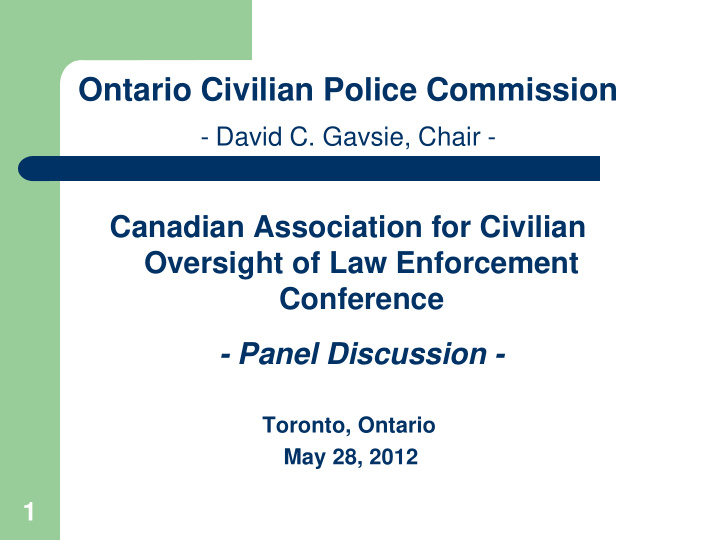



Ontario Civilian Police Commission - David C. Gavsie, Chair - Canadian Association for Civilian Oversight of Law Enforcement Conference - Panel Discussion - Toronto, Ontario May 28, 2012 1
Overview An Ontario Perspective on…. 1. Budget Matters 2. Police Restructuring 3. Relevant Factors – Adequacy 2
Commission Overview Powers set out in the Police Services Act , R.S.O. 1990, c. P.15, as amended (the “ Act ” ). Serve the public by ensuring that adequate and effective policing services are provided in a fair and accountable manner. Ultimately, questions of “ adequacy and effectiveness ” of police services in Ontario are decided by the Ontario Civilian Police Commission (the “ Commission ” ). 3
Adequacy and Effectiveness Every municipality must provide adequate and effective policing in accordance with the needs of the community – s. 4(1). Adequate and effective policing includes five core services at a minimum: Crime prevention, Law enforcement, Assistance to victims of crime, Public order maintenance, and Emergency response. 4
Adequacy and Effectiveness If the Commission finds that a municipality is not providing adequate and effective police services, it may request the Ontario Provincial Police (OPP) to provide assistance – s. 9(1). Should the Commission find that a municipal police service is not providing adequate and effective police services or is not complying with the Act and its regulations, it may inform the overseeing police services board and direct it to take measures which it considers necessary – s. 9(2). 5
Role of the Police Services Board It is the responsibility of the police services board which oversees a local police service to set an annual budget for both the service and itself. That budget estimate is presented to municipal council. Upon reviewing the estimates, council establishes an overall budget for the board – s. 39(3). Municipal council does not have the authority to approve or disapprove specific items in the estimates – s. 39(4). An example of when the Commission is called upon to assess “adequacy” is in the context of a budget dispute. 6
Budget Matters In the majority of cases, budgetary differences between boards and municipal councils are resolved through discussion and compromise. If not, the board can ask the Commission to hold a hearing to resolve the dispute – s. 39(5). The Commission will hold a hearing governed by the Act and Rules of Practice. Other parties may intervene. The sole focus is on the “adequacy” of the police service being 7 provided to the locale.
Police Restructuring The Commission is also called upon to assess “adequacy” with respect to the following: the amalgamation of police services; reduction of personnel including police offices, civilian and cadets; or abolishment or disbandment of existing police services in favour of the OPP. In all such cases, approval of the Commission is required. 8
Police Restructuring A public information meeting is held to hear presentations and receive submissions from the public on whether or not what is being proposed would provide “adequate and effective” policing in the community. The Commission is always concerned that “adequate and effective” policing services will be maintained for the locale involved. Severance pay of those affected must be looked after. 9
Relevant Factors – Adequacy Relevant issues among others: (i) Historical (ii) Comparative (iii) Prospective (iv) Alternatives 10
Relevant Factors – Adequacy Historical Considerations o Level of policing in the past o Crime rates over the years o Population o Calls for service o Response times o Use of overtime o Case loads 11
Relevant Factors – Adequacy Comparative o Policing services in similar communities of similar size o Comparative costs per capita o Comparative crime rate o Comparative crime clearance rates o Comparative number of officers per reported crime 12
Relevant Factors – Adequacy Prospective o Any changes to the community that may warrant an increased investment in policing such as anticipated growth or decline o Municipality’s ability to pay 13
Relevant Factors – Adequacy Alternatives o Any means available to the PSB to provide a similar level of front-line service at a lower cost? o Can certain expenses be deferred or stretched out over a longer period of time? 14
Relevant Factors – Adequacy Factors are viewed in light of the unique nature of each community, such as: summer vacation destination towns which experience large seasonal influxes of population; police services which are responsible for a broader local area; or demographics of the local population (i.e. needs of a retirement community vs. a university town). 15
Relevant Factors – Adequacy The Commission has received some of the following documents in prior cases to assist in making its decision: recent audit or inspection reports which might bear on the adequacy of the service, its compliance with established provincial standards, or health and safety considerations; community surveys on policing and local public attitudes toward the service; or where staffing is at issue, recent workload and deployment studies. 16
Relevant Factors – Adequacy None of this should suggest that an assessment is merely a question of compiling statistics, surveys, audits and reports. These are certainly valuable but must be put into context. The Commission will often look to the opinions of the chief of police and Ministry advisor for their professional assessment. As well, the submissions of the municipal Police Association, council members and citizens add greatly to a fuller understanding of the issues under consideration. 17
Recommend
More recommend